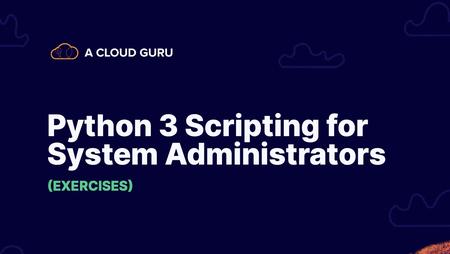English | MP4 | AVC 1920×1080 | AAC 44KHz 2ch | 53 Lessons (8h 43m) | 3.01 GB
Develop the skills you need to write effective, powerful scripts and create command line tools using Python 3.
In this course, you will develop the skills you need to write effective and powerful scripts and tools using Python 3. We will go through the necessary features of the Python language to be able to leverage its additional benefits in writing scripts and creating command line tools (data types, loops, conditionals, functions, error handling, and more). Beyond the language itself, you will go through the full development process including project setup, planning, and automated testing to build two different command line tools.
Table of Contents
Getting Started
1 Course Introduction
2 About the Course Author
3 Course Features and Tools
Environment Setup
4 Setting up a Cloud Server Development Environment
5 Installing Python 3 on CentOS 7
6 (Optional) Installing Python 3 on DebianUbuntu
Introducing Python
7 History Benefits of Python
8 Whats the Deal with Python 3
Running Python
9 Introducing the REPL for Rapid Experimentation
10 Creating and Running Python Scripts
11 Using Comments
Common Data Types
12 Strings
13 Numbers (int and float)
14 Booleans and None
15 Working with Variables
16 Lists
17 Tuples
18 Dictionaries (dicts)
Control Flow
19 Conditionals and Comparisons
20 The while Loop
21 The for Loop
22 Logic Operations
Basic Scripting
23 Reading User Input
24 Function Basics
25 Using Functions in Scripts
26 Using Standard Library Packages
27 Working with Environment Variables
28 Interacting with Files
Intermediate Scripting
29 Parsing Command Line Parameters
30 Robust CLIs with argparse – Part 1
31 Robust CLIs with argparse – Part 2
32 Handling Errors with tryexceptelsefinally
33 Exit Statuses
34 Execute Shell Commands from Python
35 Advanced Iteration with List Comprehensions
Useful Standard Library Packages
36 random json
37 shutil glob
38 re math
Using Pip and Virtualenv
39 Installing Third-Party Packages Using pip
40 Virtualenv
41 Using Third-Party Packages in Your Scripts
Planning Project Structure
42 Examining the Problem Prep Work
43 Planning Through Documentation
44 Initial Project Layout
Implementing Features with Test Driven Development
45 Introduction to TDD and First Tests
46 Implementing CLI Guided By Tests
47 Introduction to Mocking in Tests
48 Implementing PostgreSQL Interaction
49 Implementing Local File Storage
50 Implementing AWS Interaction
Integrating Features and Distributing the Project
51 Wiring the Units Together
52 Building and Sharing a Wheel Distribution
Final Steps
53 Whats Next
Resolve the captcha to access the links!
